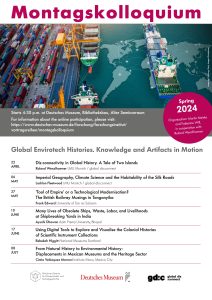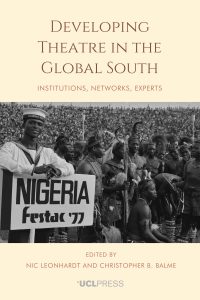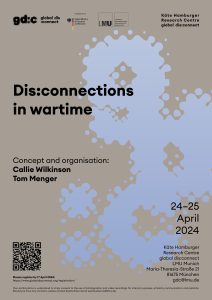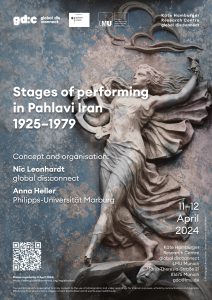22 July, gd:c annual lecture
 Shannon Jackson (Berkeley), Delivery systems: ecological infrastructures across the arts
Shannon Jackson (Berkeley), Delivery systems: ecological infrastructures across the arts
 Shannon Jackson (Berkeley), Delivery systems: ecological infrastructures across the arts
Shannon Jackson (Berkeley), Delivery systems: ecological infrastructures across the arts
 Workshop at the Käte Hamburger Research Centre global dis:connect, LMU Munich, organised by Günther Sandner and Alexander Reutlinger
Workshop at the Käte Hamburger Research Centre global dis:connect, LMU Munich, organised by Günther Sandner and Alexander Reutlinger
19 July 2024
Scientific Utopias and Visual Languages – New Perspectives on Otto Neurath
Idea and Motivation: The workshop is intended to connect multidisciplinary perspectives on Otto Neurath’s work regarding scientific utopias and visual languages (including Isotype). The event is a cooperation of the Käte Hamburger Research Centre global dis:connect (LMU Munich) and the Munich Center for Mathematical Philosophy (LMU Munich).
 Vernissage: 21 June, 18:00-22:00, Habibi Kiosk, Münchner Kammerspiele, Maximilianstr. 26, 80539 Munich
Vernissage: 21 June, 18:00-22:00, Habibi Kiosk, Münchner Kammerspiele, Maximilianstr. 26, 80539 Munich
Processes of globalisation, their effects and their constraints affect each of us every day. Still, the media, politics and academia tend to shape what globalisation means to us. Headlines and political spin reduce our perception of it to sound bites, like ‘Millionendorf’ (a village of millions) or ‘Weltstadt mit Herz’ (a global city with a heart).
The Global Munich. In Perspective exhibition starts from the assumption that globalisation means something very different for many of us. Hence, artists Hêlîn Alas, Aydin Alinejad, Jeanno Gaussi, Sofia Dona, Nikolai Gümbel, Narges Kalhor and Franziska Windolf will tell us their stories of globalisation in the city of Munich.
Hêlîn Alas charts and analyses economies and approaches of the art system, with its implicit privileges based on class, origin and gender. In diversity work LIVE (Lenbachhaus), she invites visitors to playfully retrace the intra-institutional contrast between the outward image of the art system, which emphasises diversity, and its internal homogeneity.
Where can I feel at home in a globalised world? In Gis (‘wisp of hair’ in Persian), their short film, screenwriter Aydin Alinejad and screenwriter-director Narges Kalhor tell the story of Faezeh, who is about to return to Iran from Germany.
Jeanno Gaussi’s art deals with mechanisms of remembrance, the search for identity and attendant processes of social and cultural appropriation. In her work entitled Salaam Kâkâ Bilkâ (‘Hello Uncle Bilkâ’) Jeanno Gaussi reflects on the world of global goods and the markets where they’re exchanged, identifying supermarkets as meeting places for various communities in her own experience.
Nikolai Gümbel’s work is characterised by multimedia and highly contextualised pieces. In his video piece Schichten, die wir sehen (Abschnitt I, Ausgrabung und Modell) (The Layers We See (Part I, Excavation and Model), the artist obliquely treats the emergence of Freiham-Nord, a new subdivision in Munich, to investigate the past and future realms of possibility of a seemingly ahistorical, post-global place that, according to the brochures, is supposed to be open to all.
Franziska Windolf’s art deals with the question of how sculpture and the body can take on personal-political meanings and how they move through speech, history and social relations. In her works, she recollects stories of exile in Munich, begging the question whom or what we actually remember.
Moreover, the exhibition will present a video from the site-specific installation APPLAUS by artist Sofia Dona. The work treats the Starnberger wing of the main train station in Munich as a location of arrival. Combining various stories of mobility, Sofia Dona’s work presents the station as a place that incorporates forgotten stories of various actors in the city’s globalisation narrative.
From their diverse perspectives and biographies, these artists cast a critical gaze on gaps in our knowledge about Munich as a locus of globalisation. As part of the What is the City NOW? Festival, we celebrate diverse perspectives on Munich along with the city’s inhabitants and ask: what does globalisation mean to you?
Please click here to download the programme flyer of the exhibition.The Festival What is the City NOW? is an initiative by global dis:connect, Münchner Kammerspiele (MK), the TUM Center for Arts and Culture, Habibi Kiosk, balkaNet e.V., Cine Vélo Cité, Städtische Galerie im Lenbachhaus und Kunstbau München, MK:Mitmachen, Refugio Kunstwerkstatt, MK: Musik, Cozy Sound Sytsem, Mittelschule am Gerhart- Hauptmann- Ring, Hochschule München (Faculty of Architecture), EU Horizon Projekt, NEBourhoods: PEARL Creating Cultural Places for Young People in Neuperlach Curated by Martín Valdés-Stauber with Andrea Benze, Elke Bauer, Sophie Eisenried, Mona Feyrer, Julia Lena Maier, Gina Penzkofer, Marvin Scheler, Janina Sieber und Clara Valdés-Stauber, Jakob Weiß
For more information on the festival programme, please click here. Continue Reading
Date: 26-28 June 2024
Venue: Historisches Kolleg, Kaulbachstraße 15, 80539 Munich
Please register via franziska.nicolay-fischbach@historischeskolleg.de. The programme can be found here.Symposium
Constitutional history on trial – status quo, combined methods and new sources
Historisches Kolleg Munich, 26–28 June 2024
The symposium discusses new approaches to constitutional history, drawing inspiration from other fields, especially from legal sociology and legal anthropology, new cultural and political history, gender studies, the law and literature movement, global history and the study of transnational phenomena. Numerous questions for an interdisciplinary constitutional history arise, including:
• How can we grant non-state actors proper consideration?
• What methods help to analyse unwritten or uncodified constitutions?
• How do constitutional norms relate to interpretation and practice?
• What patterns of meaning and interpretations of the world do constitutions represent?
• How does normativity relate to narration in constitutional texts?
• What social and religious norms compete with constitutions?
• How do underprivileged groups become subjects of constitutions, and what role do social movements play?
• How can we detach constitutional history from its national framework and develop it into a history of entanglement?
• What neglected sources should we analyse, and what familiar sources require re-reading?
The symposium brings together scholars from various disciplines and explores methods of constitutional history of modern and pre-modern times. The point of departure is a broad understanding of constitutions as the basic orders underlying communities.
If you are not able to travel to Munich, you can still join us online:
Zoom Meeting https://us06web.zoom.us/j/5629820818?pwd=OHl3SWFSaUdnckhueTFuS0kwZnV1QT09
Meeting-ID: 562 982 0818 Code: 834985
Deutsches Museum, Monday Colloquium: Global Envirotech Histories - Knowledge and Artifacts in Motion
All lectures start at 16:30 and take place in room 1402, library building, Deutsches Museum, Museumsinsel 1, 80538 Munich
Click here to download the poster. Continue Reading Workshop at the Paris Lodron University Salzburg, organised by Martin Knoll (Salzburg), Eva-Maria Troelenberg (Düsseldorf) and Roland Wenzlhuemer (Munich)
Workshop at the Paris Lodron University Salzburg, organised by Martin Knoll (Salzburg), Eva-Maria Troelenberg (Düsseldorf) and Roland Wenzlhuemer (Munich)
Please register here by 12 June .
To download the programme, please click here.
Continue Reading From the Planetary to the Global, and other lost histories of the 20th century.
From the Planetary to the Global, and other lost histories of the 20th century.
In 2023, the appointment of an 'oilman' to lead one of the most important climate change conferences of our time, COP28, raised some controversy. But it was not the first time that oilmen have taken the lead in international environmental governance. In this lecture, Professor Glenda Sluga returns to this lost history of the involvement of 'oilmen' in the earliest examples of international environmental governance in order to recover the extent and significance of early 1970s' debates focused on the 'planetary'.
Prof. Dr. Glenda Sluga, European University Institute, Florenz/ The University of Sydney
Introduction: Prof. Dr. Roland WenzlhuemerPlace &. date: LMU Hauptgebäude, Hörsaal M118, 3 June 2024, 6:30-8 pm
Organisers: Department of History, LMU and global dis:connect
Continue Reading Developing Theatre in the Global South
Developing Theatre in the Global SouthStart: 17:00 at Käte Hamburger Research Centre global:disconnect, LMU Munich, Maria-Theresia-Str. 21, 81675 Munich
followed by a reception Continue Reading Perhaps nothing demonstrates the complexities of globalisation more clearly than war. The international reverberations of Russia’s invasion of Ukraine have painfully exposed the interconnected nature of modern economies and our vulnerability to forces beyond our control, prompting anxious speculations about deglobalisation. Yet, experts agree that the more likely outcome is not isolation, but instead, changing geographies of connection. Similarly, recent historical scholarship has complicated conventional understandings of war as a dividing force, instead emphasizing both the connections and disconnections that it brings in its wake. In wartime, enemies are dehumanised in government propaganda, travel is disrupted, and trade blockades are enforced.
Wartime is associated with absences, interruptions, and detours, as lives are lost, scientific exchanges are cut off, and mobilized populations find themselves transported far from home. Yet, war can also create new spaces of interaction and encounter, sometimes across enemy lines. Some of these exchanges are illicit, such as smugglers who evade military blockades, or spies who penetrate enemy territory. Others are more overt, between prisoners of war and their captors, or surgeons who treat enemy combatants. War can provide the impetus for new connections and the widening of geographical horizons in the pursuit of resources, sometimes with lasting consequences. War, in other words, is the optimal lens through which to trace global connections and disconnections.
Perhaps nothing demonstrates the complexities of globalisation more clearly than war. The international reverberations of Russia’s invasion of Ukraine have painfully exposed the interconnected nature of modern economies and our vulnerability to forces beyond our control, prompting anxious speculations about deglobalisation. Yet, experts agree that the more likely outcome is not isolation, but instead, changing geographies of connection. Similarly, recent historical scholarship has complicated conventional understandings of war as a dividing force, instead emphasizing both the connections and disconnections that it brings in its wake. In wartime, enemies are dehumanised in government propaganda, travel is disrupted, and trade blockades are enforced.
Wartime is associated with absences, interruptions, and detours, as lives are lost, scientific exchanges are cut off, and mobilized populations find themselves transported far from home. Yet, war can also create new spaces of interaction and encounter, sometimes across enemy lines. Some of these exchanges are illicit, such as smugglers who evade military blockades, or spies who penetrate enemy territory. Others are more overt, between prisoners of war and their captors, or surgeons who treat enemy combatants. War can provide the impetus for new connections and the widening of geographical horizons in the pursuit of resources, sometimes with lasting consequences. War, in other words, is the optimal lens through which to trace global connections and disconnections.
Place & date: Munich, 24-25 April 2024
Organisers: Callie Wilkinson and Tom Menger (LMU Munich)
Venue: Käte Hamburger Research Centre global dis:connect, Maria-Theresia-Straße 21, 81675 Munich
Please click here to download the programme. Workshop by Nic Leonhardt (global dis:connect) and Anna Heller (Philipps-Universität Marburg)
Workshop by Nic Leonhardt (global dis:connect) and Anna Heller (Philipps-Universität Marburg)
With the introduction of European drama in the mid-19th century, a new model of theatre emerged in Iran, which in the 20th century developed from a previously amateur activity into an established cultural institution of modern society. In contrast to the processes of social change in Pahlavi Iran (1925–1979), the cultural-historical relevance of the performing arts has not yet been fully explored.
For a holistic approach, this workshop will look at different forms of stage art, including dance, theatre, musical theatre and festivals. The neglect or separate consideration of the musicological aspects of the performing arts reinforces the importance of these forms.
In the context of global theatre histories, understood as the historiography of connections, interweaving, exchanges and dis:connections, the workshop covers a wide range of subtopics. Contributions range from the development of dramatic art and literature in the early Pahlavi era, social criticism and state ideology in the dramatic arts, to opera and stage dance in the late Pahlavi era. The aesthetics of unconventional stages, the theatre of the absurd and the Shiraz Arts Festival are addressed along with biographical approaches to the history of women in theatre.
During the two days of the workshop, we will engage in intensive dialogue on these topics. We will also discuss the increasing methodological obstacles to fieldwork and archival work in the region.